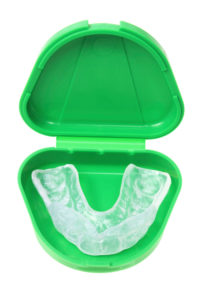
A mouthguard, coupled with you learning how to relax, can reduce your teeth grinding.
It’s shocking how many people may need a mouthguard but don’t realize it. According to the Sleep Foundation, 80% of Americans grind their teeth while sleeping. If you’re among this 80% of people, you could be doing severe damage to your teeth. Today we’re going to share five signs that you most likely need a mouthguard. It’s our duty as dentists to share as much information with you as possible to keep your dental health on track.
Grinding Your Teeth Has Caused One or More to Chip
Some people can grind their teeth in such an aggressive way that they cause a tooth to chip. If this is the case, the first thing that you should do is schedule an appointment for restorative dentistry services so that we can get your smile back on track. The next step is finding a solution for your grinding. Mouthguards protect your enamel and provide a cushion for your teeth to prevent further damage.
You Need to Wear a Mouthguard If You Consistently Grind Your Teeth
For some people, grinding their teeth happens occasionally. Stress from work or other factors could cause them to grind their teeth at night periodically. However, if the teeth grinding is consistent and happens every night, you need a mouthguard to come in and save the day. Otherwise, night grinding will slowly but surely, wear down your teeth.
You Experience Headaches When You Wake Up
If you have unexplainable headaches in the morning, this could be due to teeth grinding. It’s a horrible feeling when you start your day with a headache. A mouthguard, coupled with you learning how to relax, can reduce your teeth grinding. Playing soft music before you sleep or working out can help you have a deeper sleep so that you aren’t stressed and you don’t clench your jaw at night.
If You Take Antidepressants
Research has shown that particular antidepressants such as Prozac, Paxil, Zoloft, and Celexa may cause tooth grinding. If you are experiencing this, you’ll want to talk to your doctor about adjusting your dosage or taking a different medication.
If You Have TMJD
Temporomandibular Joint Disorder (TMJD) refers to the inflammation of the jaws and muscles. This condition occurs from grinding your teeth at night. Clenched jaws put a lot of pressure on the tissues and muscles surrounding your jaw, and a mouthguard can alleviate this. Mouthguards can also minimize the pain associated with TMJD.
Oral Care from Catonsville Dental Care in Arbutus
Whether you want to whiten your teeth, straighten your teeth, or have a wisdom tooth extracted, Catonsville Dental Care offers a wide variety of services when it comes to oral health. We have the experience and understanding to diagnose and treat any problem you have as quickly and painlessly as possible. With four dentists available at our office and commitment to comfort, safety, and relaxation, you can’t find a better provider for your health. We look forward to helping you keep your smile perfect all year long and talking with you about your needs. To schedule an appointment or consultation, visit us online or give us a call at 410-747-1115. For more tips and tricks, follow us on Facebook, Flickr, Twitter,andYouTube.
